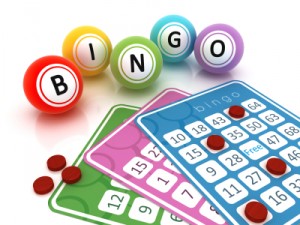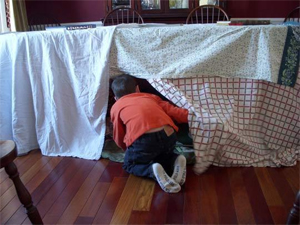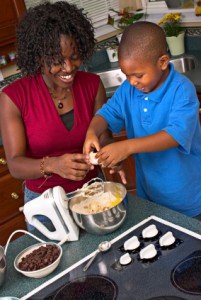
Parenting, Therapy Tips  During the winter months there are many outdoor activities parents can participate in with their children, such as building snowmen, going ice skating, sledding, or building a snow fort in the yard. All of these activities keep children entertained while providing an opportunity to stimulate the child’s speech and language skills.
However, Mother Nature does not always cooperate and we are forced to invent indoor ideas for entertainment. The following are some suggestions for ways to beat cabin fever while promoting fun and learning.
During the winter months there are many outdoor activities parents can participate in with their children, such as building snowmen, going ice skating, sledding, or building a snow fort in the yard. All of these activities keep children entertained while providing an opportunity to stimulate the child’s speech and language skills.
However, Mother Nature does not always cooperate and we are forced to invent indoor ideas for entertainment. The following are some suggestions for ways to beat cabin fever while promoting fun and learning.
Speech and language goals may include:
1. Naming actions (“Mommy hide.” “Jake go in/out.”)
2. Using carrier phrases to aid in expressive language skills (“I put on pillow.” “I put on blanket.”
3. Problem solving and predictions (“What will we use to make a fort?” “Will that stay up?”)
4. Building vocabulary and concepts (fort, build, stack, destroy, crawl, inside/outside, on/under)
5. Naming sequence of events using first, next, last
6. Recalling sequences of events
7. Social predictions/interaction and building anticipation with “peek-a-boo” game in and out of fort
Goals may include:
8. Increasing vocabulary (spoon, spatula, whisk, stir, mix, scoop, ingredients, vanilla, sugar, flour)
9. Naming and recalling sequence of events
10. Delayed-versus-immediate recall of events. Try to ask your child later in the day about the activity and which steps he or she took to make an item or set the table
 Try not to give into the temptation to allow your child to win every game. Although we want to build our children’s self esteem, it is important to teach them how to lose as well. If your child is disappointed by losing, a loving home with compassionate opponents is a good environment for an unfavorable reaction. You are there to guide your child’s response. Parents can model good sportsmanship when they lose by using phrases such as, “Oh well, it’s just a game.” or “That was fun! Can we play it again?”
No matter which activity you choose, remember to keep it simple and fun. Try to be flexible with your child’s shifts in interest and enjoy the time you are spending together.
Try not to give into the temptation to allow your child to win every game. Although we want to build our children’s self esteem, it is important to teach them how to lose as well. If your child is disappointed by losing, a loving home with compassionate opponents is a good environment for an unfavorable reaction. You are there to guide your child’s response. Parents can model good sportsmanship when they lose by using phrases such as, “Oh well, it’s just a game.” or “That was fun! Can we play it again?”
No matter which activity you choose, remember to keep it simple and fun. Try to be flexible with your child’s shifts in interest and enjoy the time you are spending together.
Learn 14 great Speech & Language Skills While Beating Cabin Fever
Guest Post by: By Jennifer Hill During the winter months there are many outdoor activities parents can participate in with their children, such as building snowmen, going ice skating, sledding, or building a snow fort in the yard. All of these activities keep children entertained while providing an opportunity to stimulate the child’s speech and language skills.
However, Mother Nature does not always cooperate and we are forced to invent indoor ideas for entertainment. The following are some suggestions for ways to beat cabin fever while promoting fun and learning.
During the winter months there are many outdoor activities parents can participate in with their children, such as building snowmen, going ice skating, sledding, or building a snow fort in the yard. All of these activities keep children entertained while providing an opportunity to stimulate the child’s speech and language skills.
However, Mother Nature does not always cooperate and we are forced to invent indoor ideas for entertainment. The following are some suggestions for ways to beat cabin fever while promoting fun and learning.
 Build an Indoor Fort
Build an Indoor Fort
Speech and language goals may include:
1. Naming actions (“Mommy hide.” “Jake go in/out.”)
2. Using carrier phrases to aid in expressive language skills (“I put on pillow.” “I put on blanket.”
3. Problem solving and predictions (“What will we use to make a fort?” “Will that stay up?”)
4. Building vocabulary and concepts (fort, build, stack, destroy, crawl, inside/outside, on/under)
5. Naming sequence of events using first, next, last
6. Recalling sequences of events
7. Social predictions/interaction and building anticipation with “peek-a-boo” game in and out of fort
 Bake cookies or prepare a family meal
Bake cookies or prepare a family meal
Goals may include:
8. Increasing vocabulary (spoon, spatula, whisk, stir, mix, scoop, ingredients, vanilla, sugar, flour)
9. Naming and recalling sequence of events
10. Delayed-versus-immediate recall of events. Try to ask your child later in the day about the activity and which steps he or she took to make an item or set the table
Play a board game
Go Fish!, memory games, and bingo are very good choices. Games promote a variety of speech and language skills: 12. Increasing attention and cooperation during a joint activity. 13. Turn-taking skills 14. Social skills Try not to give into the temptation to allow your child to win every game. Although we want to build our children’s self esteem, it is important to teach them how to lose as well. If your child is disappointed by losing, a loving home with compassionate opponents is a good environment for an unfavorable reaction. You are there to guide your child’s response. Parents can model good sportsmanship when they lose by using phrases such as, “Oh well, it’s just a game.” or “That was fun! Can we play it again?”
No matter which activity you choose, remember to keep it simple and fun. Try to be flexible with your child’s shifts in interest and enjoy the time you are spending together.
Try not to give into the temptation to allow your child to win every game. Although we want to build our children’s self esteem, it is important to teach them how to lose as well. If your child is disappointed by losing, a loving home with compassionate opponents is a good environment for an unfavorable reaction. You are there to guide your child’s response. Parents can model good sportsmanship when they lose by using phrases such as, “Oh well, it’s just a game.” or “That was fun! Can we play it again?”
No matter which activity you choose, remember to keep it simple and fun. Try to be flexible with your child’s shifts in interest and enjoy the time you are spending together.
For more great winter tips read 8 Sensory Suggestions for the Holidays & Winter Season
Jennifer Hill, MA, CCC/SLP is a Speech-Language Pathologist Kaufman Children’s Center for Speech, Language, Sensory-Motor & Social Connections

